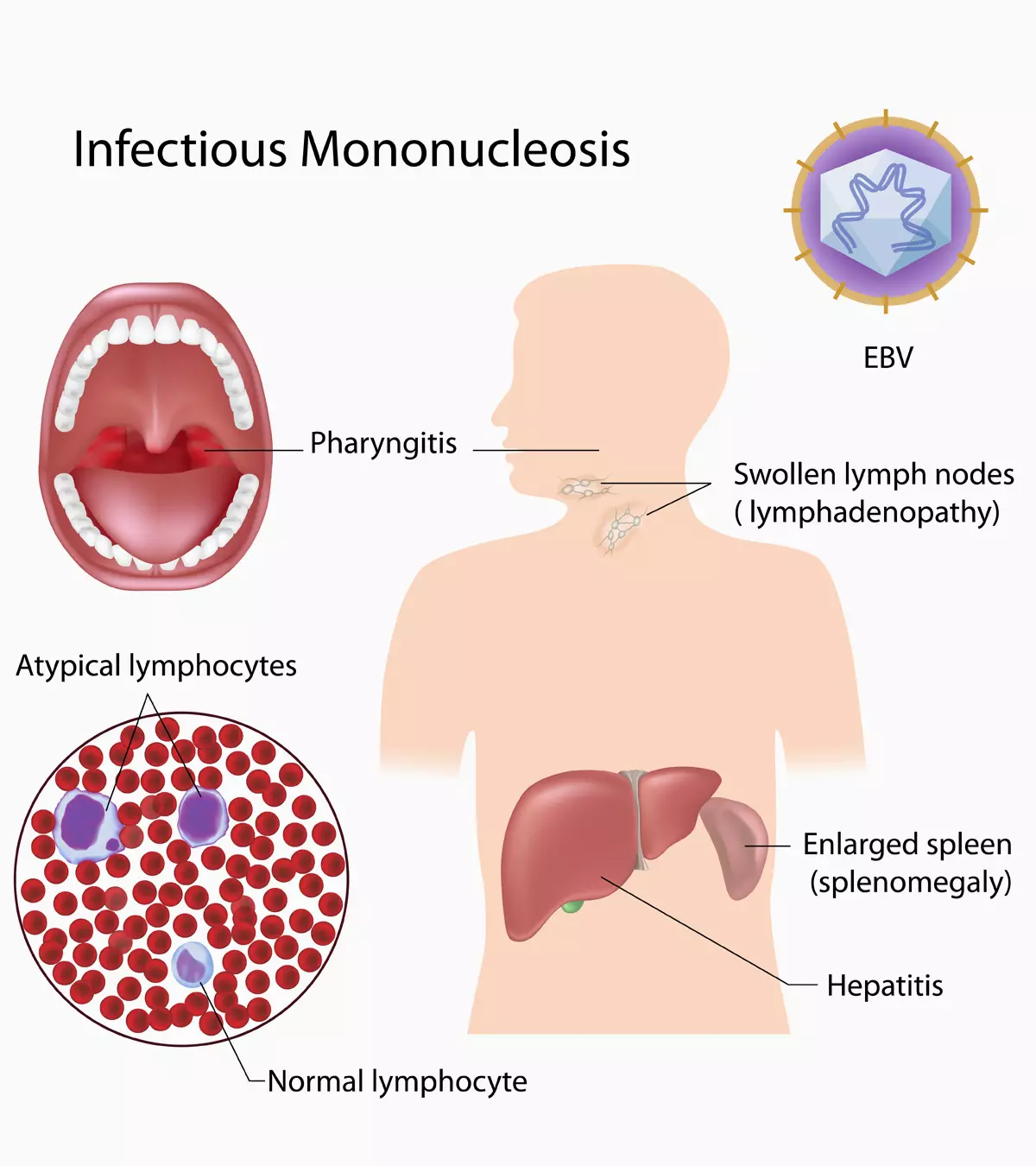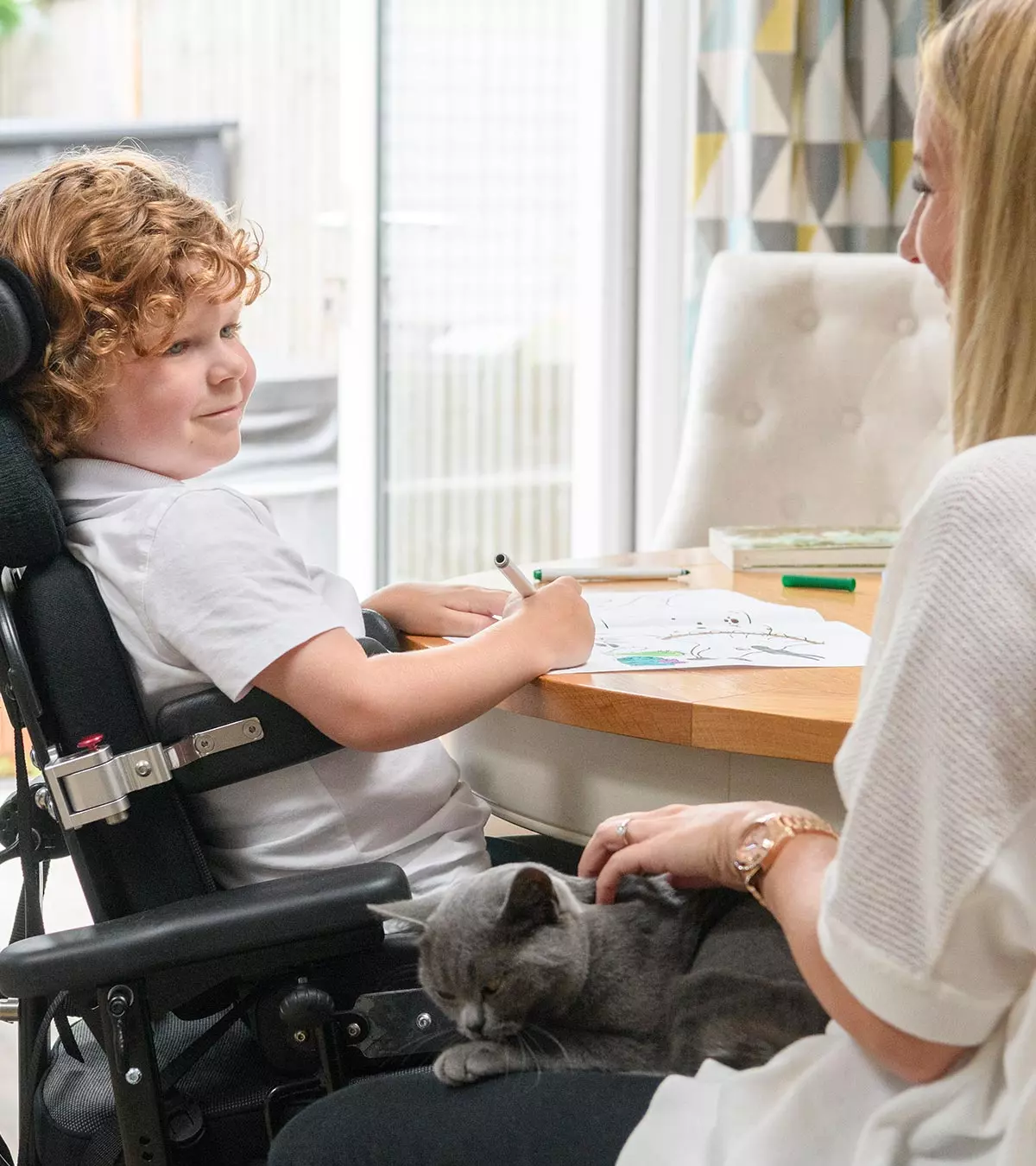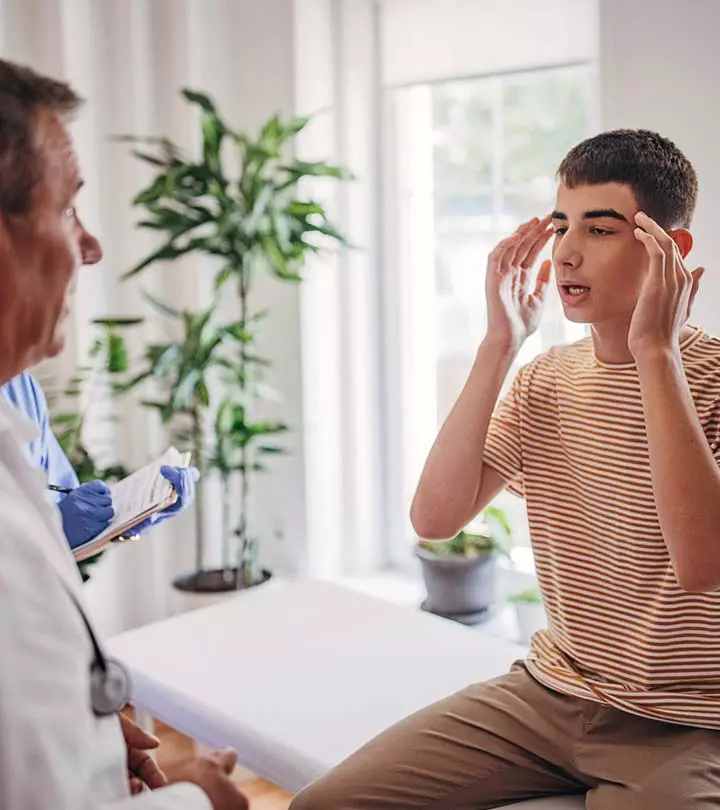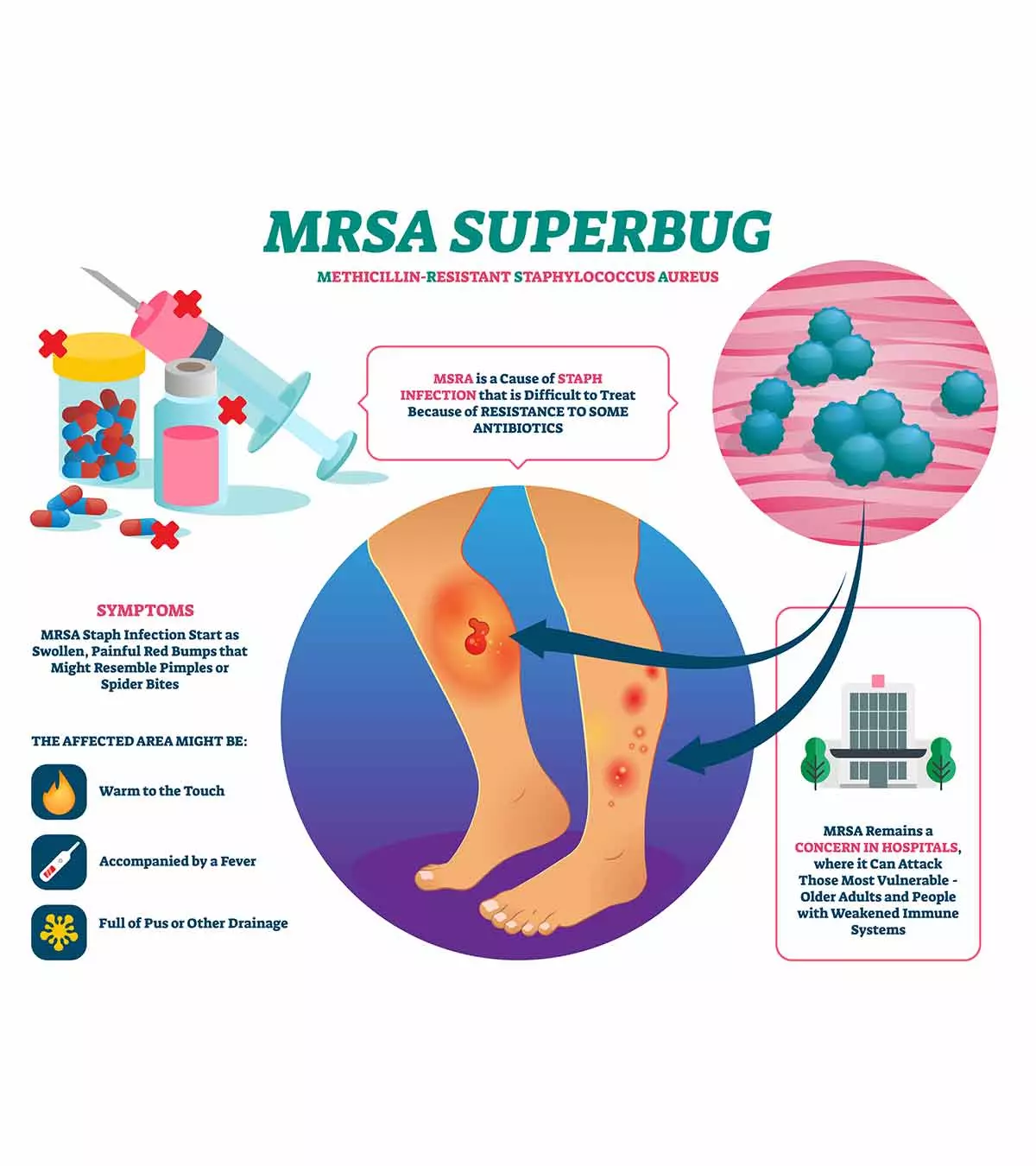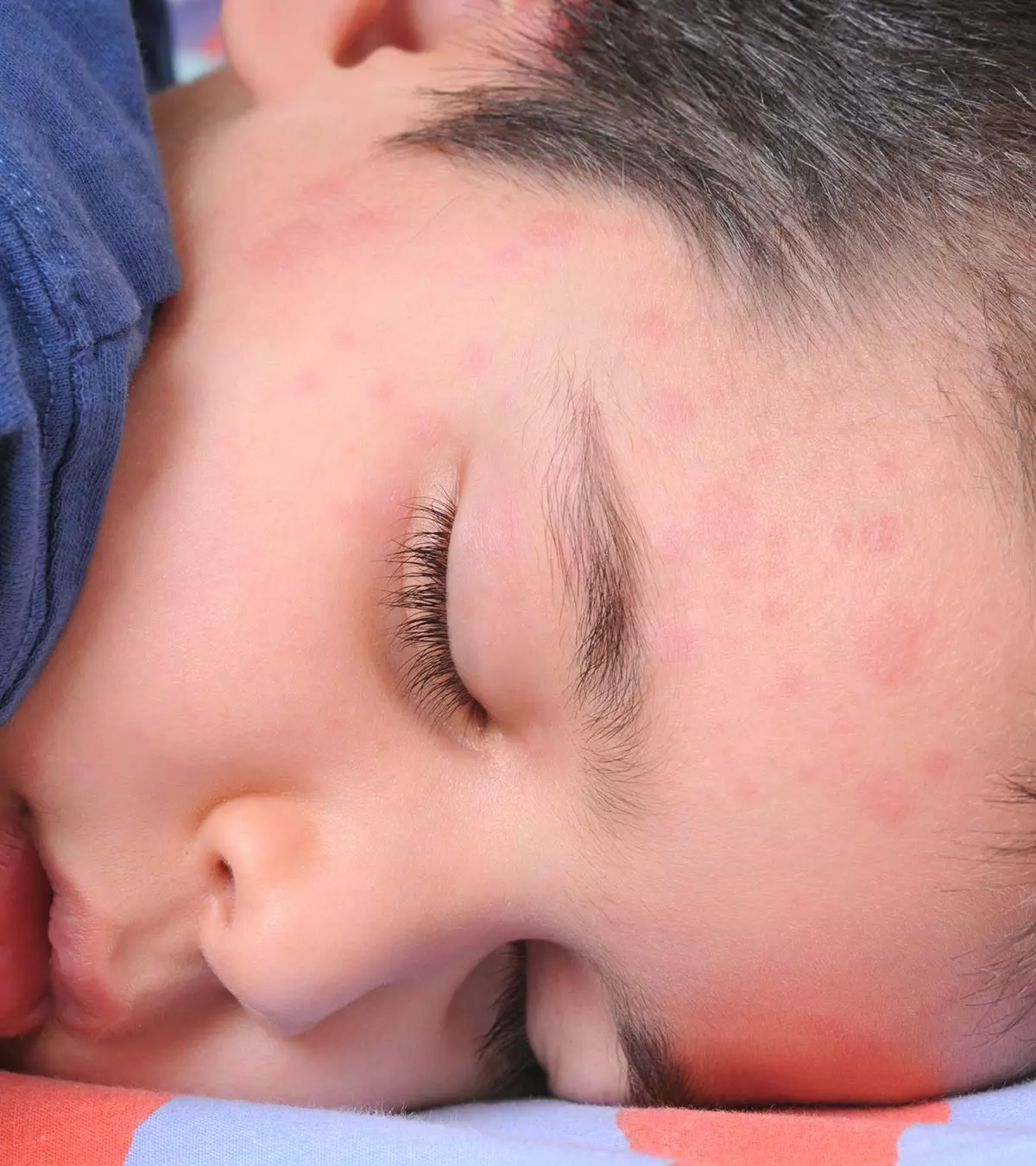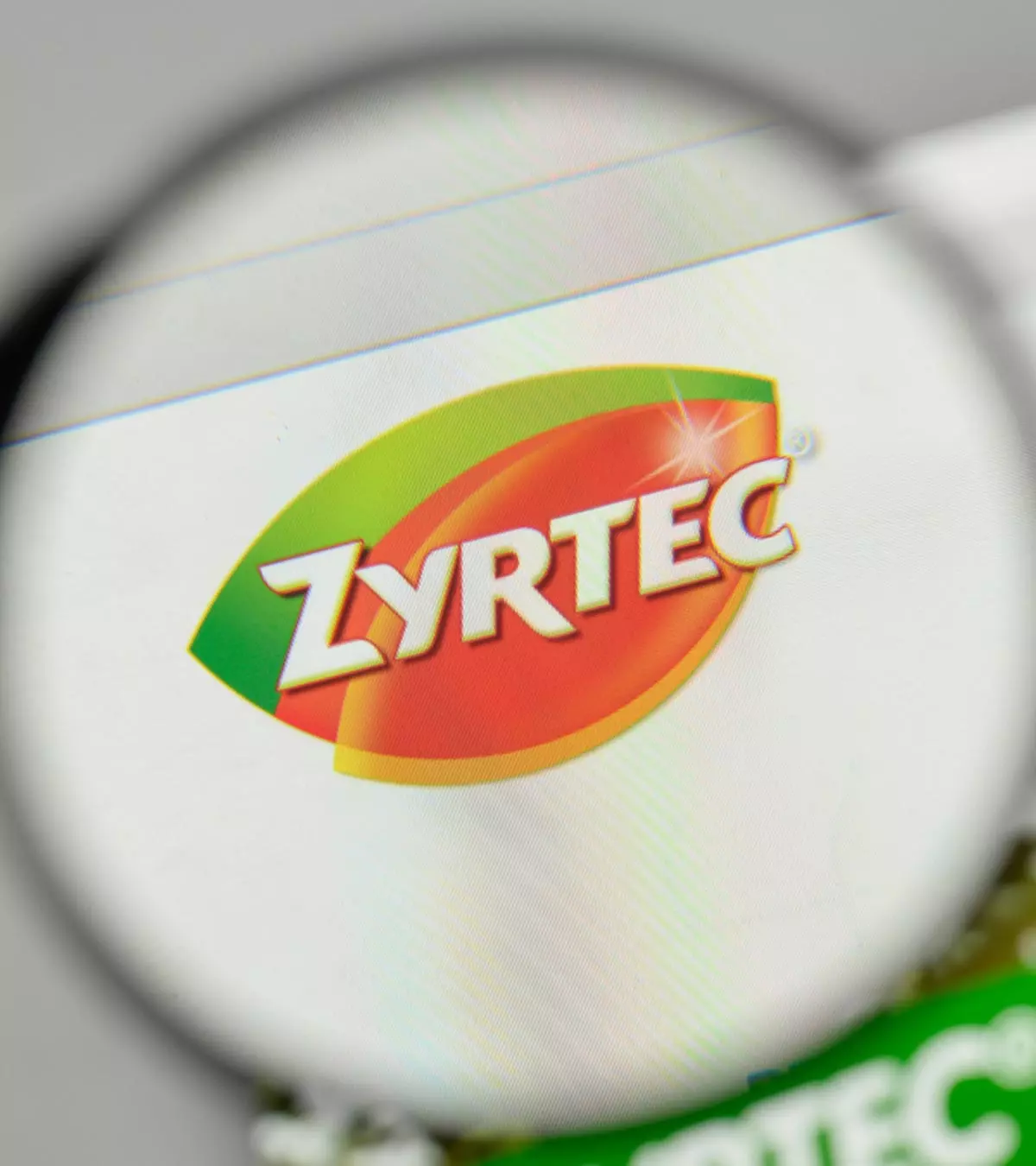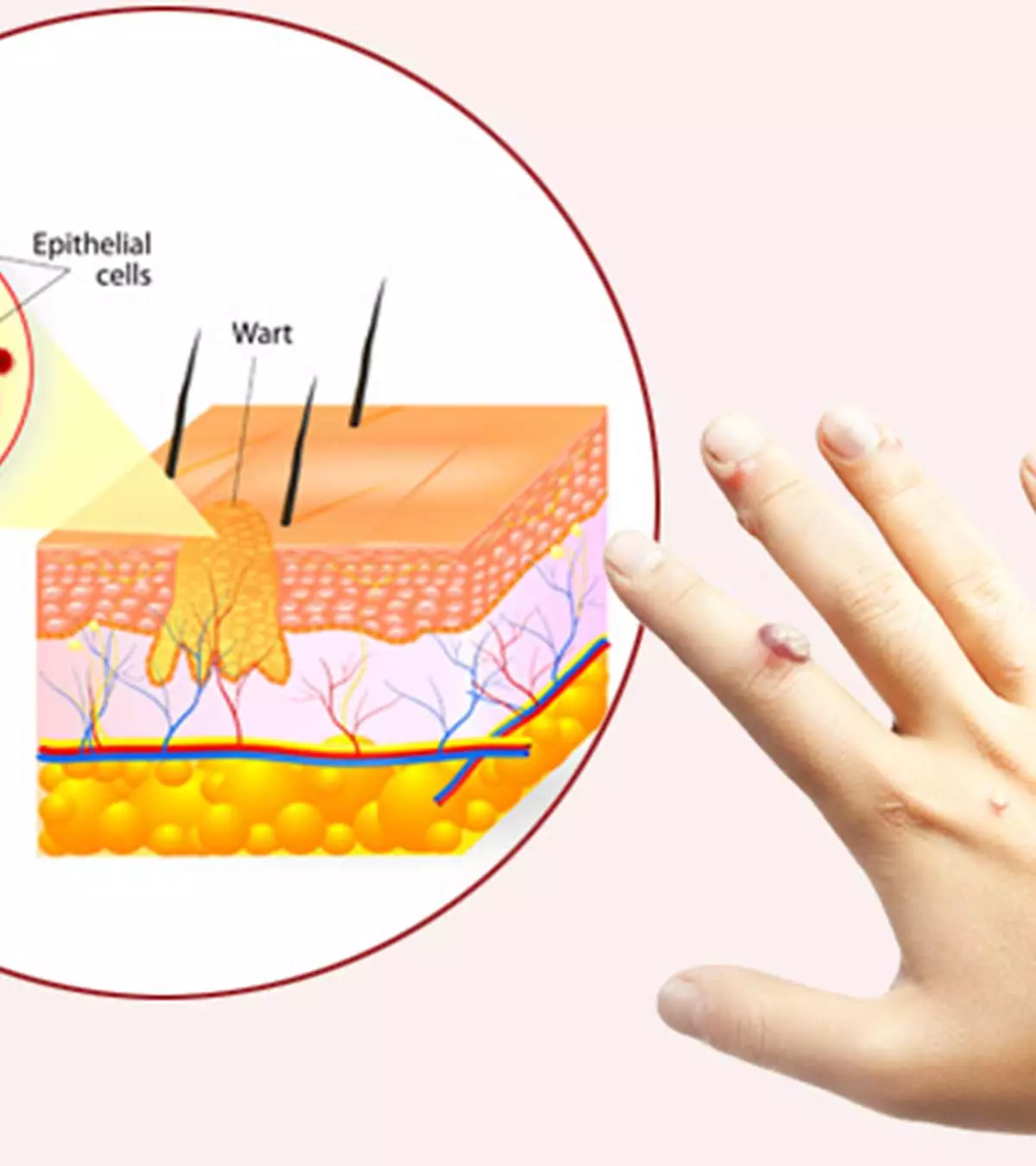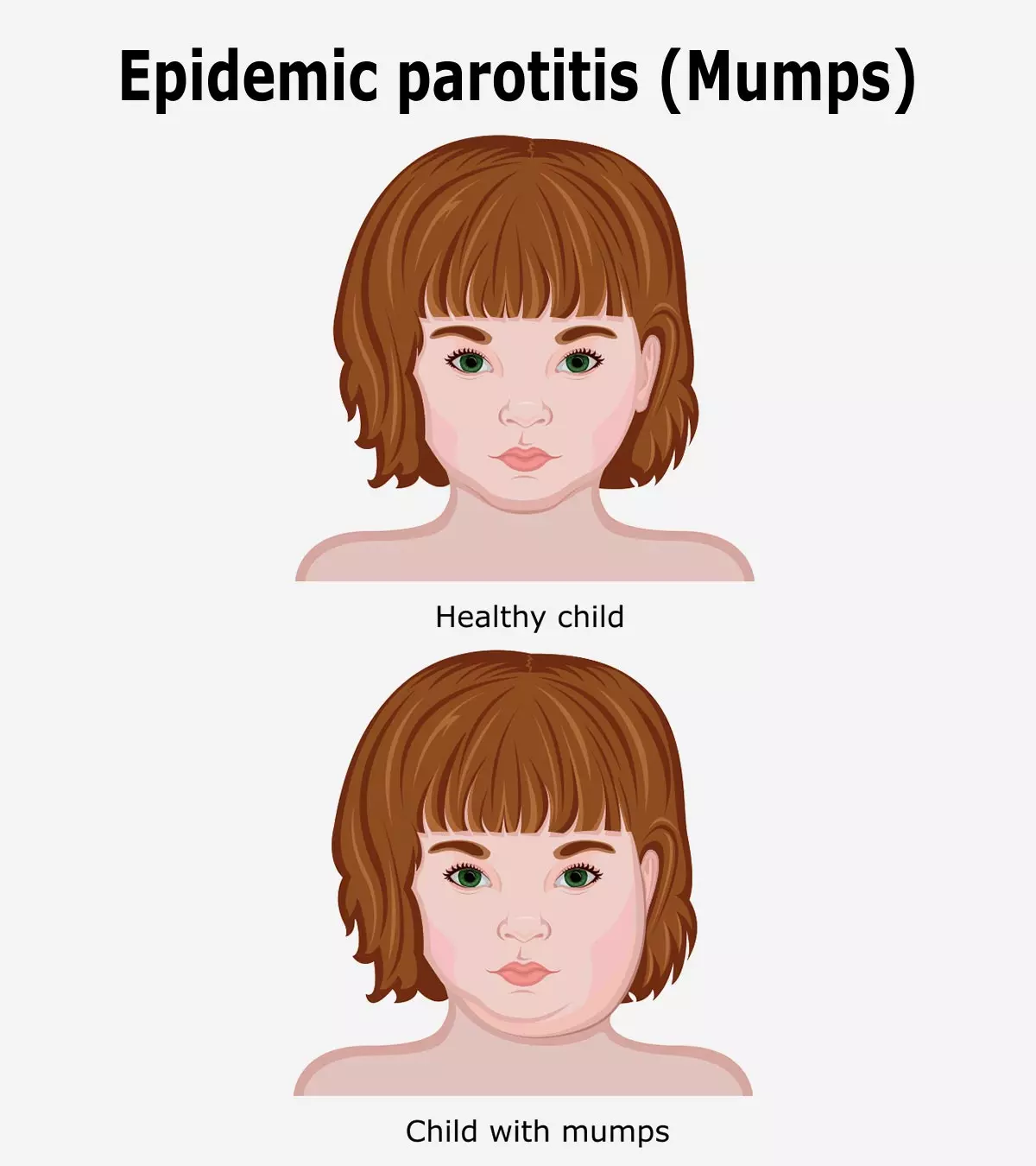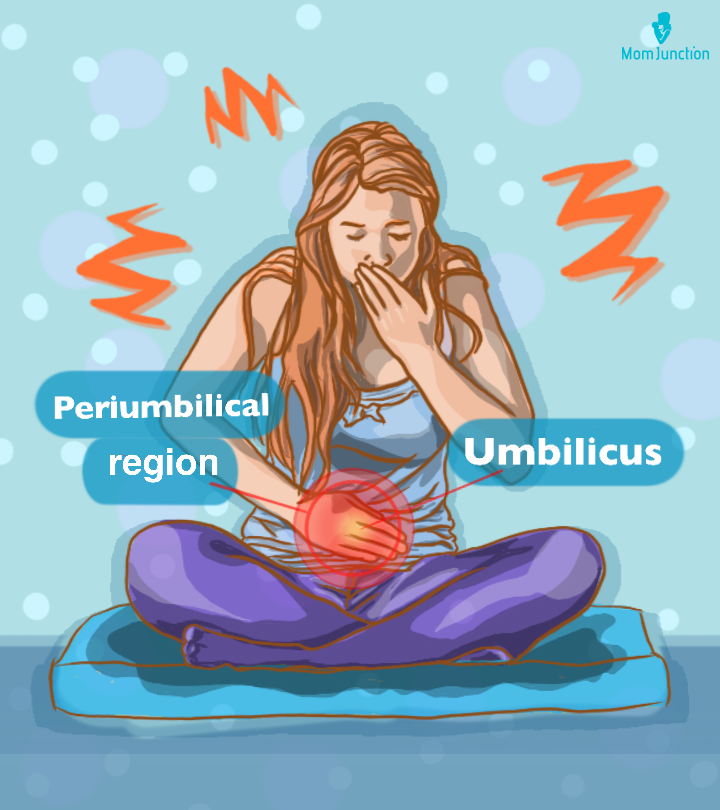
Image: ShutterStock
Chest pain in teens is uncommon, and it can be due to cardiac or non-cardiac diseases (1). Fortunately, chest pain in teens usually occurs due to non-cardiac conditions. In most cases, it can be due to conditions such as asthma or chest wall pain from muscle or bone injuries or inflammation. However, chest pain is a concerning symptom at any age, and healthcare providers should evaluate it to diagnose the underlying cause. Read on to know the causes, accompanying symptoms, diagnosis, and treatments for chest pain in teens and when to seek medical care.

Key Pointers
- Chest pains in teenagers are usually non-cardiac in nature.
- Heartburn, lightheadedness, and sweating are common symptoms of chest pain in teens.
- Teens with a family history of heart disease or experiencing stress have a higher risk of developing chest pains.
- If chest pain is accompanied by syncope and loss of consciousness, seek medical attention immediately.
- Making dietary changes and getting enough sleep and rest can help relieve symptoms of chest pain in teenagers.
Signs And Symptoms Associated With Chest Pain In Teens
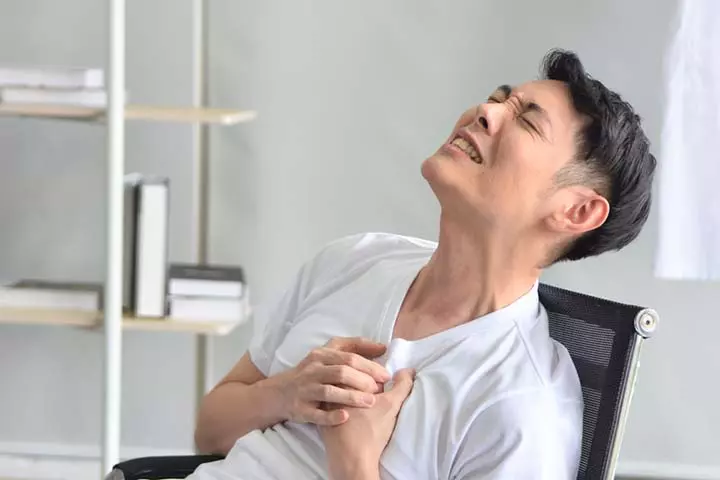
Signs and symptoms present, along with chest pain, may depend on the underlying cause. The pain can be felt as a burning, sharp, or throbbing sensation in the chest, depending on the cause.
The following are some of the signs and symptoms that may occur along with chest pain (2).
- Shortness of breath
- Rapid heartbeat
- Cough
- Heartburn (burning sensation behind the sternum)
- Tenderness on the chest wall
- Swallowing difficulties
- Sour taste in the mouth
- Fever
- Sweating
- Nausea or vomiting
- SyncopyiA sudden temporary loss of consciousness followed by a rapid recovery.
- Lightheadedness
Chest tightness or pressure with crushing pain is a classic symptom of a heart attack or myocardial infarction. Chest pain due to a heart attack may last for a few minutes to a few hours. However, the above-listed symptoms can be seen in cardiac and non-cardiac chest pain.
If your teen had chest pain for a few days or weeks, then it could be due to non-cardiac causes (3). However, it is important to seek doctors’ attention for diagnosis and early treatment.
Chest Pain In Teens: When To Worry?
If your teen has chest pain with other symptoms such as shortness of breath, rapid heart rate, syncopy or loss of consciousness etc., then seek immediate medical care (4). According to a clinical instructor of internal medicine, Dr. Curt Daniels, “There is an increased incidence of vasodepressor syncope in this age group, which may be due to a lifestyle change. When kids hit adolescence, they tend to become more active in sports and usually start leading a teenage lifestyle, characterized by not eating much or drinking enough fluid while staying very active (17).”
Acute onset of chest pain due to trauma can often indicate conditions causing fluid or air accumulation in the pleural cavity (cavity around the lungs) or pericardial cavity (cavity around the heart). It can be fatal in a short time if left untreated. Seek emergency care if your teen has an acute onset of chest pain.
 Quick fact
Quick factCauses Of Chest Pain In A Teenager
Chest pain can be grouped into cardiac chest pain and non-cardiac chest pain. Non-cardiac chest pain is usually more common in teens (5).
Non-Cardiac Chest Pain
Non-cardiac chest pain may account for 98% of chest pain experienced in adolescents and children. This can be mainly due to musculoskeletal pathologies, gastrointestinal problems, such as acid reflux in teens, or pulmonary problems. The following diseases can be the reason for non-cardiac chest pain (5).
1. Musculoskeletal chest pain
Chest wall or musculoskeletal or thoracic pain can be the most common cause of chest pain in teens. Various diseases and conditions can cause pain in the thoracic (chest) area.
- Costochondritis: This is also known as costosternal syndrome and may cause stabbing pain (sternalgia) on one side of the chest. Costochondritis is the inflammation of cartilages of the rib cage that are attached to the sternum (breast bone).
- Tietze syndrome: It is the inflammation of the cartilages attached to the ribs. The syndrome often occurs due to excessive coughing during an upper respiratory tract infection.
- Non-specific or idiopathic chest wall pain: It is a sharp pain lasting a few seconds to minutes without the signs of inflammation.
- Slipping rib syndrome or lower rib pain syndrome: This can be due to trauma or dislocation of lower ribs.
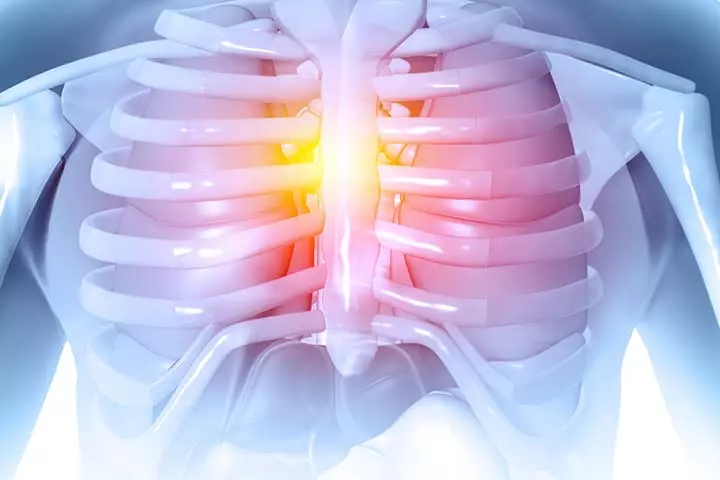
- Muscle strain and injuries: Chest wall trauma or muscle strain mostly occurs due to weightlifting, gymnastics, or other sports activities. Chest wall injuries can present localized tenderness and pain. However, teenagers who experience chest pain with breathing trouble or rapid heartbeat after trauma, such as fall, road accident, etc., may require immediate medical care to rule out pericardial or myocardialiDiseases concerning the muscles of the heart damages.
- Texidor twinge or precordial catch: It is a sudden sharp pain on the left side of the chest. It can be due to a pinched nerve or a poor body posture.
- Xiphodynia or hypersensitive xiphoid syndrome: It is a pain in the part of the breast bone called the xiphoid process.
2. Chest pain related to the respiratory system
Around 2 to 11% cases of chest pain can be of pulmonary origin. Bronchial asthma is one of the major causes of airway-related chest pain in teens. According to the Asthma and Allergy Foundation of America, asthma affects 4.8 million children under 18 in the US. Among these children, asthma is more common in boys (7.3%) than girls (5.6%) (18).
The respiratory causes of acute chest pain can be due to bronchial or lung infections that include:
- PneumoniaiA bacterial, viral, or fungal infection in the lung that can cause the air sacs to fill with fluid or pus
- Empyema
- BronchitisiAn inflammation of the bronchial tubes that can cause a cough and mucus production
- BronchiectasisiA chronic lung condition where the airways become permanently damaged and widened, leading to increased mucus production and risk of infections
- Lung abscess
If your teen has sickle cell diseaseiA genetic disorder that distorts the shape of red blood cells, which impacts the oxygen transport in the body , then seek immediate medical care for chest pain. They may have chest pain due to acute chest syndrome or pulmonary infarction.
 Things to know
Things to know3. Chest pain due to gastrointestinal conditions
Gastrointestinal causes of chest pain can often be associated with other digestive problems, such as:
- Gastrointestinal reflux diseaseiA condition where the reflux of stomach contents to the food pipe causes burning and discomfort in the chest (GERD)
- Peptic ulcer disease
- Esophageal spasm
- EsophagitisiA condition in which the esophagus (food pipe) is inflamed, causing health issues including chest pain and heaviness
- CholecystitisiInflammation of the gallbladder, presenting with symptoms such as gastric discomfort, pain in the chest and abdomen
Food intake can increase or decrease chest pain in some gastrointestinal conditions.
4. Anxiety-related chest pain
Chest pain can be a physical symptom of anxiety in teens. Controlled case studies on teens indicate that 67.5 percent of 194 patients had chest pains that were attributed to anxiety disorders (19). Psychogenic chest pain can often be felt in teens who have experienced a stressful situation in their lives. Common psychogenic triggers may include illnesses, examination stress, loss of a loved one, trauma from abuse or neglect, and other relationship problems (20).
Anxiety or panic attacks may cause hyperventilation. It may lead to chest pain resulting from heavy breathing and distention of the stomach from swallowing air (aerophagia).
 Quick fact
Quick fact5. Breast-related chest pain
Breast-related chest pain can be commonly seen in some teenage girls. This can be a throbbing or burning pain on one or both sides of the chest. Postmenarchal chest pain can be due to mastitisiA bacterial infection characterized by inflammation and redness in the breast tissue , pregnancy, or fibrocystic changes of the breast. Teenage boys with gynecomastiaiA benign increase in breast tissue caused by an imbalance of estrogen and testosterone hormones may have breast-related pain.
6. Skin conditions
Herpes zoster infection may often cause pain on the chest wall, followed by the appearance of blisters (skin rash) after a few days.
7. Scoliosis or other deformities
Teens, who have scoliosisi or other vertebral or postural deformities that cause compression of the spinal cord and nerves, may have chest pain.
A blogger and mother, Laura Bruzzese, shares how her teen daughter Isabella’s chest pain was linked to her posture, “For the past six months or so, Isabella has been complaining of occasional rapid heartbeats, chest pressure, and random, shooting chest pain that she supposedly emanated directly from her heart. She normally walks slightly hunched, with her long, slim arms folded at the bottom of her ribs. Because the complaints of rapid heartbeat seemed to be on the rise, I took her to the pediatrician. After careful consideration, the doctor thought Isabella could possibly have supraventricular tachycardia (SVT), basically a short circuit in the heart’s electrical system that causes it to repeatedly beat rather than complete a cycle. A referral to the pediatric cardiologist was issued.
“The cardiologist came in and looked at the heart movies on three different monitors. He saw only healthy valves, flow, pumping, all things cardiac. As these reassuring declarations of normal heart issued forth, I looked across the room and saw Isabella visibly brighten. He suggested that one possible explanation (for the pain and discomfort) is Isabella’s very structure: tall, slim, long. It could be that she feels her heart more intensely than the rest of us and experiences anomalies that we all have but aren’t aware of (i).” Isabella’s case demonstrates the diverse range of non-cardiac causes that could potentially cause chest pain in teenagers.
8. Precordial catch syndrome (PCS)
Also known as Texidor’s twinge, PCS may cause a sudden onset of intense, sharp chest pain in an otherwise healthy teen. The pain may be aggravated by simple movements that do not require the teen to exert themselves, such as breathing in and out. While the exact cause of this condition remains unconfirmed, PCS may occur while one is at rest and may last for a few minutes before resolving by itself. These episodes of pain may be distributed across the day without any known side effects or treatments. The condition tends to disappear on its own as the teen grows older (5) (20).
Cardiac Chest Pain
Rarely, teenagers can have chest pain due to heart problems. It accounts for less than 6% of chest pain cases among teens. Conditions affecting the oxygen supply of the cardiac muscle can cause chest pain due to lactic acidosis. This type of chest pain is called angina pectoris or simply angina.
The following conditions can cause heart-related chest pain in teens (5) (6).
- Pericarditis and pericardial effusion: Inflammation of the pericardium and accumulation of excess fluid in the pericardial cavity. It can cause sharp retrosternal painiA sharp, sudden, and radiating pain/discomfort inside the chest or beneath the breastbone .
- Myocarditis: Inflammation of the heart muscles.
- Endocarditis: Inflammation of the inner lining of the heart.
- Structural heart defects: Chest pain can be the first symptom of many anatomical heart defects such as mitral valve prolapse (Barlow syndrome), aortic valve stenosisiA condition where the valve (opening) of the aorta artery becomes narrow, reducing the rate of blood flow from the heart , etc.
- Coronary artery diseases: Teens with coronary artery disease can have myocardial ischemia (coronary heart disease), resulting in exertional chest pain.
- History of cardiac surgeries: Coronary heart disease can be a cause of chest pain in teens with a history of cardiac surgeries.
- Aortic dissection: It is severe chest pain radiating to the back and often seen in teens with connective tissue disorders, such as Marfan syndrome. Teens with Turner's syndromeiA chromosomal abnormality characterized by a single X chromosome in females , Ehlers-Danlos syndromeiA set of hereditary conditions affecting the connective tissues, skin, and blood vessels , and homocystinuriaiA hereditary metabolic condition in which the body fails to metabolize certain crucial amino acids (such as methionine) can also be at an increased risk of dissection.
- Arrhythmias: Pediatric chest pain can be due to slow or fast heart rhythms.
- Drug use: The use of certain decongestants, methamphetamine, marijuana, or cocaine can cause irregular heart rhythm and ischemia that may result in chest pain.
- Kawasaki disease and giant coronary artery aneurysms: These conditions could lead to stenosis (narrowing of blood vessels) and thrombosis (clot inside a blood vessel), thus causing ischemia and chest pain.
Diagnosis Of Chest Pain In Teens
Your teens’ doctor may order a few tests after evaluating symptoms and physical examination. These tests help identify the exact cause of chest pain. The following examinations may be conducted based on clinical findings (7).
- Electrocardiography (ECG) helps identify the electrical activity of the heart.
- Echocardiography can identify structural and functional abnormalities of the heart.
- Exercise stress or treadmill test monitors ECG while exercising. It can help identify any abnormalities in heart rate or rhythm during exertion.
- Chest X-ray may help identify lung pathologies.
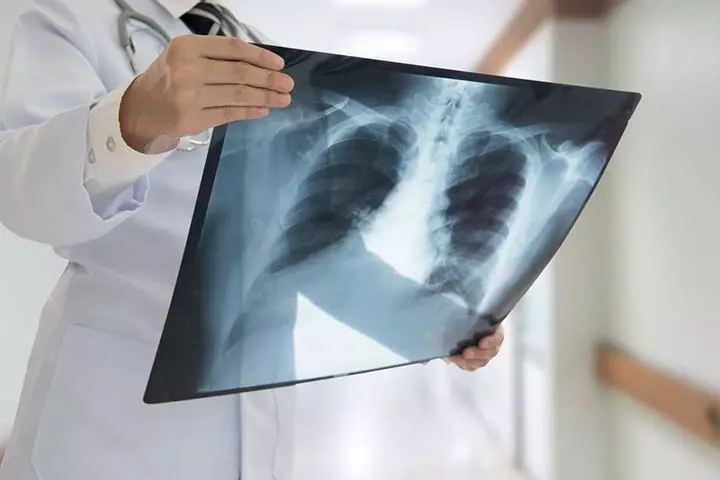
- Endoscopy is done to asses gastroesophageal reflux disease (GERD) and other upper gastrointestinal conditions.
- Blood tests can be useful in identifying any inflammatory markers.
- Lung function tests can be useful in the diagnosis of asthma.
The tests are often ordered based on the history of symptoms and findings on physical examination. The doctor may refer the teen to a pediatric cardiologist or other specialists based on the results of the evaluation.
It is recommended to restrict physical activities until the cardiac evaluation is completed. Some teens have to use a Holter monitor or transtelephonic monitor for two days or up to the suggested time to find the sudden onset of irregular heartbeat (arrhythmia).
If the teen has chest pain without any physical reasons, then referral to a pediatric psychologist may be recommended for the evaluation of anxiety-related chest pain.
Treatment For Chest Pain In Teenagers
Treatment varies depending on the cause. Various treatment methods include (8)
- Cardiologists may prescribe medications and procedures as required. Heart problems such as endocarditis, myocarditis, etc., are treated with medications, whereas a few structural anomalies may require cardiac surgeries.
- NSAIDs are given for non-cardiac chest pain due to musculoskeletal problems after the diagnosis.

- A pulmonologist may treat asthma or other lung pathologies.
- Gastroenterologists may prescribe proton pump inhibitors or histamine blockers for GERD.
- Psychotherapies and medications may be prescribed for anxiety chest pain, by a psychiatrist.
- Orthopedic evaluation and treatment are required for scoliosis and other deformities.
- Deaddiction therapy may be required in the case of drug abuse.
Antibiotics are prescribed for infectious diseases that cause chest pain. Analgesic medications are often given in some causes of chest pain.
Home Remedies To Cure Chest Pain In Teens
Most teens with chest pain require prescription medication for pain relief or to treat the underlying conditions. You may ask your teen to follow the following home care measures, along with the treatment (9).
- Dietary changes: If your teen has chest pain due to GERD, then you may ask them to avoid spicy, oily, and citrus foods. Avoiding caffeinated and sugary drinks may also reduce the risk of heartburn in teens. Observing healthy and nutritious diet habits may also reduce the risk of certain heart diseases.
- Relaxation techniques: Physical activity and relaxation techniques can help your teen if they have anxiety-related pain. Meditation, yoga, and other exercises may also help reduce stress.
- Rest and sufficient sleep: Your teen requires good rest and sleep for mental and physical well-being.

- Avoid cigarette smoking: Smoking and exposure to secondhand smoke may increase the risk of respiratory infections and other diseases, which can cause chest pain.
- Avoid strenuous activity: Weight lifting and other types of exercises may increase musculoskeletal or chest wall pain.
- Avoid drug use: Use of illegal drugs may lead to chest pain due to arrhythmias. You may also support and encourage your teen to take de-addiction treatment if they are using drugs.
- Maintain a healthy weight: Obesity may increase the risk of heart diseases. You may encourage your teen to choose healthy foods over fast foods and perform non-strenuous physical activities after discussing with their doctor.
 Quick tip
Quick tipAnecdotal home remedies and over-the-counter medications may not be helpful in managing chest pain.
Risks And Complications Of Chest Pain In Teens
The following factors may be associated with a higher incidence of chest pain in teens (4).
- A family history of heart diseases.
- Stress may increase the risk of panic disorders and other anxiety disorders.
- Cigarette smoking increases the risk of asthma and other respiratory diseases.
- Substance abuse may cause chest pain due to heart rhythm changes and may result in myocardial damages.
- Dietary factors can be associated with GERD (Gastroesophageal reflux disease).
These risks may vary based on the causes of chest pain. Cardiac chest pain or angina may result in a heart attack. Air pollution and exposure to smoke may lead to exacerbation of asthma and may cause chest pain due to severe bronchospasms.
Frequently Asked Questions
1. Can vitamin B12 deficiency cause chest pain?
Vitamin B12 deficiency anemia may lead to complications of the heart and lungs as the heart would struggle to pump oxygen to all vital organs. Moreover, B12 deficiency has been linked to an increased risk of developing cardiovascular diseases (10). All these problems may increase the chances of experiencing chest pain.
2. Can dehydration cause chest pain in teenagers?
There is an increased load on the heart when there is less water in your blood; therefore, dehydration might lead to chest pain (11). Drinking enough water and other healthy drinks can promote overall health.
3. Is the teenager taking any medications that could be causing chest pain?
Research highlights that certain migraine medications, nicotine, and calcium antagonists may cause drug-induced chest pain (14). Therefore, seek medical guidance if your child is taking any medications to ensure that their medicine is causing chest pain.
4. Is chest pain in teenagers more common in males or females, and why?
Chest pain in teenagers can occur in males and females, and the prevalence may vary based on the underlying cause. However, it is vital to note that chest pain in teens is not often caused by severe cardiac issues like the ones caused in adults. 98% of the chest pain complaints account for non-cardiac chest pain among teenagers, mostly treated by analgesia. Therefore, it is crucial to always look out for symptoms and consult a pediatric cardiologist in an emergency (15).
5. How does stress impact chest pain in teenagers?
When experiencing high levels of stress, teenagers may develop muscle tension in the chest wall, leading to sharp or dull aching sensations. Additionally, stress triggers the release of cortisol and adrenaline, which can cause increased heart rate and changes in breathing patterns that may manifest as chest discomfort (16).
The underlying symptoms of chest pain in teens could be cardiac or non-cardiac, possibly due to a respiratory issue or a muscle strain. Either way, you should not ignore chest pains in any age group. If your teen has been complaining about discomfort in the chest or if you notice constant sweating, rapid heartbeat, or shortness of breath, it is safe to consult a doctor for a proper diagnosis. The treatment depends on the underlying factor and its severity. In addition, a balanced diet and regular exercises help reduce stress in teens.
Infographic: Home Remedies For Chest Pain In Teenagers
Different physiological and psychological conditions may cause chest pain in teens. And if the pain seems mild, you may take some measures to provide immediate care while waiting for medical support or pair it with the doctor’s recommendations. So explore how you can help ease your teen’s chest pain at home.
Some thing wrong with infographic shortcode. please verify shortcode syntax
Illustration: Chest Pain In Teens: Causes Symptoms And When To Worry
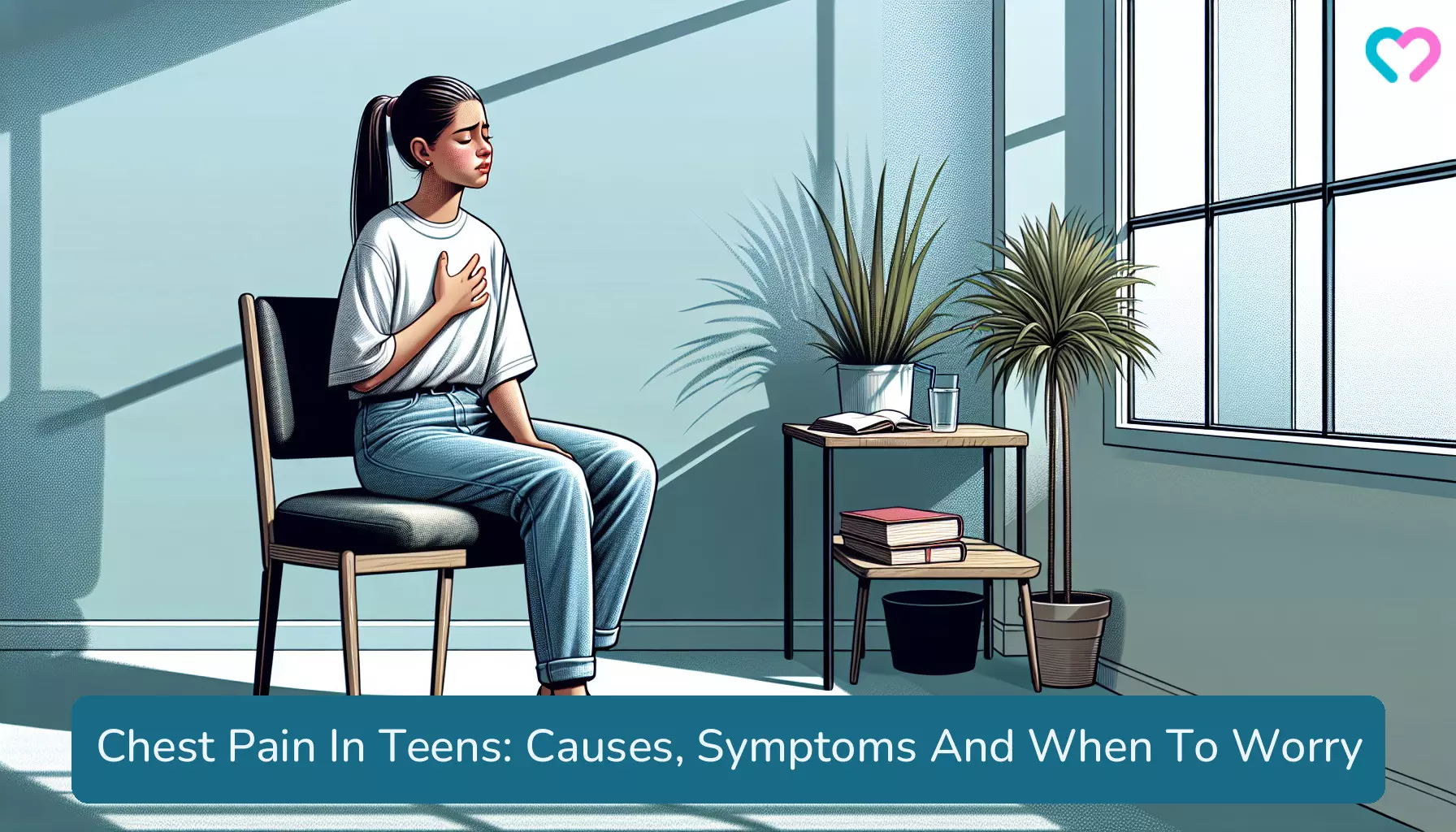
Image: Dall·E/MomJunction Design Team
Personal Experience: Source
MomJunction articles include first-hand experiences to provide you with better insights through real-life narratives. Here are the sources of personal accounts referenced in this article.
i. Isabella and the heart palpitations.https://liveclayart.com/2011/09/11/isabella-and-the-heart-palpitations/
References
- Chest pain.
https://www.nidirect.gov.uk/conditions/chest-pain - Diagnosing the Cause of Chest Pain.
https://www.aafp.org/pubs/afp/issues/2005/1115/p2012.html - Chest pain: How a doctor decides it could be a heart attack.
https://www.allinahealth.org/healthysetgo/heal/chest-pain-how-a-doctor-decides-it-could-be-a-heart-attack - Chest pain.
https://raisingchildren.net.au/guides/a-z-health-reference/chest-pain - Should You Worry About Your Child’s Chest Pain?.
https://health.clevelandclinic.org/worry-childs-chest-pain - Chest pain.
https://pch.health.wa.gov.au/For-health-professionals/Emergency-Department-Guidelines/Chest-pain - Chest Pain in Children and Teenagers.
https://www.chop.edu/conditions-diseases/chest-pain-children-and-teenagers - Chest pain.
nhttps://www.rch.org.au/clinicalguide/guideline_index/Chest_pain/ - Chest pain.
https://www.betterhealth.vic.gov.au/health/conditionsandtreatments/chest-pain - Complications.
https://www.nhs.uk/conditions/vitamin-b12-or-folate-deficiency-anaemia/complications/ - Dehydration.
https://my.clevelandclinic.org/health/diseases/9013-dehydration - Chest Pain in Children and Adolescents
https://www.dukehealth.org/blog/chest-pain-children-and-adolescents - Chest Pain.
https://www.seattlechildrens.org/conditions/a-z/chest-pain/ - Drug-induced chest pain and myocardial infarction. Reports to a national centre and review of the literature
https://pubmed.ncbi.nlm.nih.gov/9403280/ - Identifying and Treating Chest Pain
https://www.nationwidechildrens.org/-/media/nch/for-medical-professionals/practice-tools-new/identifying-and-treating-chest-pain.ashx - Stress Effects On The Body
https://www.apa.org/topics/stress/body - Chest Pain In Adolescents Is Common But Rarely Serious.
https://news.osu.edu/chest-pain-in-adolescents-is-common-but-rarely-serious/ - Asthma Facts
https://aafa.org/asthma/asthma-facts/#:~:text=It%20is%20afemale%20children.2 - Zahra Khairandish et al.; (2017); Role of anxiety and depression in adolescents with chest pain referred to a cardiology clinic.
https://pubmed.ncbi.nlm.nih.gov/26979465/ - What Causes Pediatric Chest Pain?
https://health.clevelandclinic.org/worry-childs-chest-pain
Community Experiences
Join the conversation and become a part of our nurturing community! Share your stories, experiences, and insights to connect with fellow parents.
Read full bio of Dr. Surabhi Gupta
Read full bio of Dr Bisny T. Joseph
Read full bio of Swati Patwal
Read full bio of Anindita Ghatak







